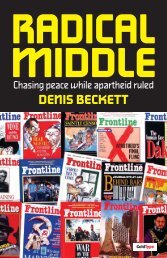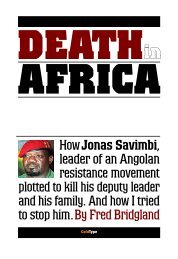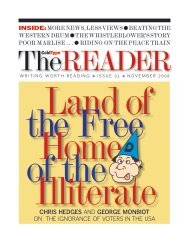UPDATED - ColdType
UPDATED - ColdType
UPDATED - ColdType
- TAGS
- updated
- coldtype
- coldtype.net
Create successful ePaper yourself
Turn your PDF publications into a flip-book with our unique Google optimized e-Paper software.
competitors, like CNN and MSNBC, to the right.<br />
In global terms, Al-Jazeera has emerged with<br />
new respect and a bigger audience. As Michael<br />
Wolff noted in New York Magazine: “The network<br />
is being transformed the way Gulf War I<br />
transformed CNN – but then CNN’s audience has<br />
never exceeded more than a few million,<br />
whereas Al-Jazeera already speaks to a good 35<br />
million people every day.<br />
“By the time this whole thing is over,” I said to<br />
three (Middle East) correspondents, “you’ll be<br />
far and away the dominant media organization in<br />
the region – one of the largest in the world! You<br />
could end up being Time Warner Al-Jazeera.”<br />
The Al-Jazeera man responded: “No, Al-<br />
Jazeera Time Warner.” Clearly, they understand<br />
brand positioning.<br />
The real war may have ended but the media<br />
war grinds on and heats up. While most of the<br />
world had its eye on Baghdad, Rupert Murdoch<br />
had his on the Direct TV satellite that he wants<br />
to add to his arsenal of media weaponry.<br />
In Washington, the FCC, under the leadership<br />
of Colin Powell’s son Michael, announced plans<br />
to lift media rules that limit concentration of<br />
WINNERS AND LOSERS<br />
47<br />
media in the hands of a few companies, this on<br />
June 2. Michael Powell has already cited the war<br />
coverage as the reason America needs media<br />
Goliaths.<br />
This story bas been badly covered in the<br />
American press, but not in England where The<br />
Guardian’s Annie Lawson reported, “U.S. broadcasters’<br />
war stance under scrutiny.” Unfortunately,<br />
only non-profit groups not the government<br />
are calling for such scrutiny. The Center for<br />
Digital Democracy, which promotes diversity in<br />
digital media, says it believes news organizations<br />
in the U.S. have a “serious conflict of interest”<br />
when it comes to reporting the policies of the<br />
Bush Administration.<br />
“It is likely that decisions about how to cover<br />
the war on Iraq – especially on television – may<br />
be tempered by a concern not to alienate the<br />
White House,” said Jeffrey Chester, the Digital<br />
Democracy Center’s executive director, in a<br />
recent article. “These media giants stand to<br />
make untold billions if the FCC safeguards are<br />
eliminated or weakened.”<br />
This issue has yet to surface in the American<br />
media. Does anyone wonder why? ●

















